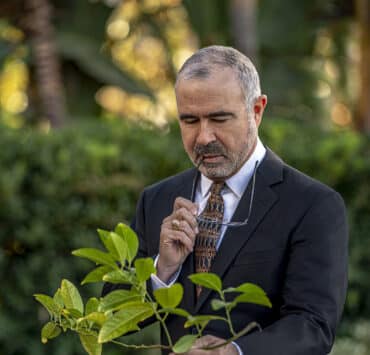Miguel Jimenez has built his international legal career deal by deal, degree by degree. Today, the senior legal counsel is helping Cintra, one of Spain’s premier transportation infrastructure companies, design, build, and finance America’s highways.
For the average American citizen, the history of Spain’s involvement in global transportation infrastructure is not common knowledge. Companies like Cintra’s parent company (the Spanish multinational giant Ferrovial) emerged in the 1960s, when the Spanish government authorized local companies to enlist foreign investors to fund badly needed Spanish toll roads.
When the oil crisis struck Spain in the 1970s, the government offered to buy back shares, but companies wisely realized their long-term investment value. The early years of concessions left Ferrovial, in particular, flush with capital and decades of experience—know-how that helped the company become a leading player in transportation markets around the world.
I’ve always loved to study; I’m someone who is always striving for excellence.”
Miguel Jimenez
Back when Jimenez was deciding upon his course of law at the age of seventeen, he couldn’t have imagined he would end up working in the US for a Spanish company. But early on in his career, his determination to master English led him to spend a summer working at New Jersey’s Six Flags. He also spent a year in London, where he interned at a UK firm. At PricewaterhouseCoopers in Madrid—his first job out of law school—Jimenez quickly became involved in cross-border financial transactions.
“From the first, I felt comfortable working with employees from other jurisdictions,” he says, “especially at the junction between Spanish and UK law.”
The Spanish government noticed. In 2010, the regional ministry in Andaluçia awarded Jimenez a scholarship to obtain a master of laws (LLM) degree at the University of Sydney. During his studies in Australia, he also went to Shanghai to study the Chinese legal system.
In 2013, Jimenez went in-house at Abengoa, a Seville-based renewable energy company. As lead Latin American counsel, he traveled two weeks every month, closing deals in Mexico, Uruguay, Chile, Colombia, and Peru.
In 2018, just over a year and half after Jimenez landed at Cintra, he was sent back to Sydney to lead the region’s legal department. A year and a half later, Cintra changed its focus to the States, and Jimenez and his family found themselves relocating to Texas.
Today, in Austin, the senior legal counsel reports to a general counsel who is also Spanish (the rest of his legal colleagues are American) and collaborates closely and proactively with a cadre of engineers, business analysts, and financiers on bids for US-based projects. “Working with legal early on is essential to the success of the team,” Jimenez says. “A lot of problems can be straightened out ahead of time.”
Cintra’s projects necessarily involve public-private partnerships, and the stakes in those partnerships are high. Today, Cintra is the majority shareholder of five concessional projects in the US, including three in the Dallas–Fort Worth area. In 2016, the Commonwealth of Virginia selected a consortium led by Cintra to finance, design, build, maintain, and operate express lanes on the I-66 corridor for approximately twenty-two miles from I-495 (Capital Beltway) in Fairfax County to US 29 (Gainesville) in Prince William County. With a total investment of $3.5 billion, the project is expected to be completed by December 2022 and will relieve congestion in some of the most traffic-heavy areas in the nation.
Now, as the Biden administration aims to direct substantial federal funds toward infrastructure, Jimenez is more excited than ever about the opportunities in store for companies like Cintra. Already, he says, Cintra has been shortlisted on a multibillion-dollar project in Pennsylvania to build up to nine bridges. “If awarded,” Jimenez says, “we will enter into these concession agreements for twenty-five to fifty years.”
Of course, the growth in this market also means that opportunities will continue to abound for leaders like Jimenez. To his mind, there is a great need for attorneys with international transactional legal experience, particularly legal experience relating to infrastructure deals.
Jimenez knows that his own development as an attorney is by no means complete. “I’ve always loved to study; I’m someone who is always striving for excellence,” he explains. “The challenge in the US is that there are fifty states and each has its own jurisdiction, so if I’m not familiar with a governmental process, I will dive in and find out. For example, I’m not an environmental lawyer, but I’m always willing to explore those topics, approach the questions in a different way, and give my opinion.”
That willingness to dig into an unfamiliar issue paid off early on in the COVID-19 pandemic, when travelers to the US were banned from entering the country. Unfortunately, that seemed to mean that if Jimenez, his wife, and their two children wanted to visit their family in Spain, they wouldn’t have been able to return.
But Jimenez dug into legislation and discovered a buried clause stating that a parent of an American-born citizen would be assured reentry. “It’s not like we planned my son’s birth in the States,” Jimenez says of his youngest child, “but it definitely turned out [to be] convenient.”
Jimenez and his family have only lived in Texas for a few years, but Jimenez feels at home. “Texas first” rolls off his tongue with a laugh, and a stuffed longhorn toy commandeers the top shelf behind him. But who knows what lies ahead for an international finance lawyer of Jimenez’s prowess? It doesn’t seem possible that Texas, however big, will be able to hold him for long.
Miguel is a creative, critical thinker whose diligence and detail-oriented approach drives his success. His leadership at Cintra has been critical to the Transform I-66 Outside the Beltway project, a vital infrastructure project for our nation’s capital, and Cadwalader is proud to be a part of the team.

